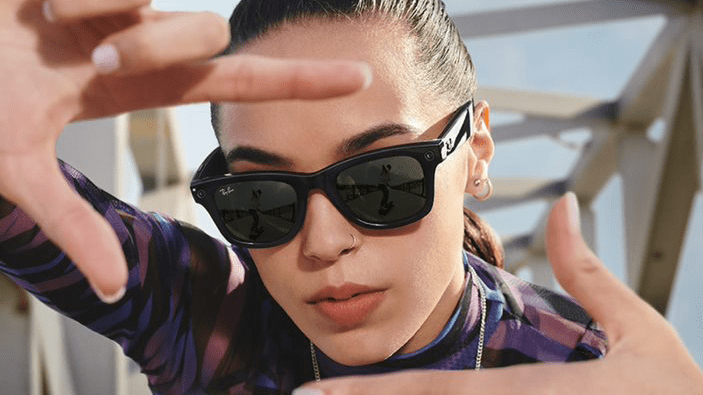Facebook is taking a run at the whole cameras-in-glasses thing

You’d look so good in these Ray-Bans. And you could literally capture the envious stares of people who can’t believe how good you’d look. Because these glasses are built through a partnership with Facebook. They allow you to take photos and share video via cameras in the frame, as well as take phone calls.
It’s the latest attempt by Silicon Valley to reap bundles of money by using tech to make glasses more than glasses. Google and Snap have also attempted it.
We here at “Marketplace Tech” are a camera-shy group, and the prospect of many more cameras makes us nervous.
Susan Landau, a cybersecurity and policy professor at Tufts University, says there’s a reason we’d be uncomfortable. The following is an edited transcript of our conversation.
Susan Landau: We’re always different when we know we’re being recorded. If I’m walking down the street with a good male friend of mine, I might pat them on the back, I might even put my arm around them, or they might do that to me — [the] sort of thing that we’re completely comfortable with. I wouldn’t be uncomfortable with my husband knowing it. But getting recorded about it? I would feel edgy. It’s a behavior that I just wouldn’t do.

Jed Kim: Could this potentially be useful? I mean, I have a co-worker who says that she’s bad with remembering faces and was wondering if this might help her keep track of that.
Landau: Of course, that would be useful. I’m also bad with remembering faces. And of course, it would be useful. I have one colleague whose partner would always whisper to her, “That’s so and so.” And that seems a more friendly way to do it. So yeah, there’s certain instances where it would undoubtedly be useful. But in any tool that collects data, you have to ask, is the benefit worth the cost?
Kim: Facebook says the glasses have been built with privacy in mind. The glasses have an LED light that lets people know when you’re taking a photo or video. And the company actually has a responsible users guidebook saying things like, “Don’t record in places like public restrooms.”
Landau: You have me laughing as you talk about a responsible users guidebook. But the the LED light, can you cover it up? Yes, you can cover it up. And if you can cover it up, and the the glasses still work, that’s not a whole lot of protection. What I’d like to see is something that makes an unpleasant noise, the same way when a truck backs up on the street. You know, as you’re crossing the street and looking only at the oncoming traffic, you hear that backing up noise and you know, ‘Oh, I should look to my right, because maybe that truck is backing up towards me.’ So if the recording glasses would make a loud, unpleasant noise, we’d all quickly learn ‘Oh, that means that a Facebook glasses recording,’ and then that would really have an impact.
Kim: I recommend an unpleasant smell.
Landau: That’s even better. But I think a little harder to do.
In a statement, Facebook said: “Providing signals to bystanders that content is being captured by a device is something that should be top of mind for all device-makers. In addition to the LED light, Ray-Ban Stories requires a physical button press or audible command to start capturing photo or video — both of which serve as additional signal to others that a photo or video is being taken.”
The company also points out that tampering with the LED light is against its terms of service.
Related Links: More insight from Jed Kim
We’ve got links to the Ray-Ban Stories product page as well as Facebook’s page on privacy and responsible wearing of the glasses.
And a Chinese company is looking into superglasses. Xiaomi’s Smart Glasses would provide wearers with an augmented reality experience by showing images on one of the lenses. They’re just a concept, but The Verge says the level of thought Xiaomi has put into it shows that it wants to be considered a player in the field.
If all of these cameras have you nervous about Big Tech and their surveillance capabilities, you may be heartened by President Joe Biden’s latest nomination of Alvaro Bedoya to the Federal Trade Commission. He has been a critic of surveillance software. His nomination is one of several moves Biden has made that appear aimed at curbing Big Tech’s power. Our regular host, Molly Wood, interviewed Bedoya about surveillance tech earlier this year. Check it out.
I was wondering if there were ways to stymie video cameras that may be recording me. Tech geek site Hackaday shows a prototype of what’s essentially the opposite of camera glasses. An engineer built glasses with infrared lights hidden in the frames. When turned on, invisible lights blaze, making the wearer’s face impossible to make out. It’s just a proof of concept, but if he wants to sell them, TAKE ALL OF MY MONEY!!!
The future of this podcast starts with you.
Every day, the “Marketplace Tech” team demystifies the digital economy with stories that explore more than just Big Tech. We’re committed to covering topics that matter to you and the world around us, diving deep into how technology intersects with climate change, inequity, and disinformation.
As part of a nonprofit newsroom, we’re counting on listeners like you to keep this public service paywall-free and available to all.
Support “Marketplace Tech” in any amount today and become a partner in our mission.


















